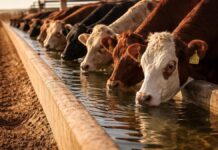There is no one-size-fits-all in the way lending institutions like FNB South Africa finance businesses, not least agribusinesses. Every client’s business has to tick the right boxes to qualify for funding, FARMERS REVIEW AFRICA establishes in an interview.
One of the biggest obstacles that prevent agribusinesses from increasing their output is the lack of or limited access to finance. Some hold the view that this is because traditional financial institutions are reluctant to participate in agricultural production due to the perceived high risk associated.
Gert Breet and Dawie Maree, specialists in agribusiness finance at FNB South Africa, dispel the notion that financiers are averse to taking on the risk of funding agricultural ventures. Instead, they clarify that every business proposal presented by a client – and farming is no exception – is treated according to its unique merits.
In particular, relating to FNB, they stress that the financial institution recognises its role in supporting ventures that can enable the country to achieve food security. Hence, as any forward-thinking entity, FNB is keen to participate in viable investments in the agricultural sector through the provision of tailor-made funding solutions.
“Our approach is informed by a business’s feasibility and the risk attached to it. We do not have a particular bias towards any type of farming business” states Breet, elaborating that, about farming, financing could be provided to any agribusiness regardless of size both expansion and start-ups.
It is only natural that financial institutions are more discreet when it comes to start-ups. This is because, typically, most start-ups do not have a track record, hence carrying a higher risk, Breet explains.
Usually, in security-based lending, the land is taken as security at 60% loan to value, and 40% as own contribution. The loan repayment period can be up to 10 years, depending on the type of business. FNB provides finance following all relative regulatory and legislative requirements applicable to commercial financiers.
“We can finance farm and livestock acquisition, orchard expansion, overdraft loans for production costs and others. We can also finance the purchase of machinery and equipment which we use as security,” says Dawie.
Additionally, with a business anchored in sustainability, FNB can finance the purchase of alternative energy products for farms such as solar power panels. In this way, the bank enables farmers to reduce emissions as well as meet energy shortages.
Beyond financing
FNB recognises that for farmers to succeed in their respective ventures, they need more than finance. That is why the bank is also involved in a host of programmes.
- Technical and financial literacy training
“FNB has various tools available like Fundaba, which focuses on financial literacy for small businesses. Where possible FNB can also collaborate with industry organisations to supply support and training to newly established farmers.”
- Government policies
FNB recognises that government policies that are pursued affect its clients, in one way or another, not least in agribusinesses. And so, it is actively involved in providing input through various industry bodies like the Banking Association and the Agricultural Business Chamber (Agbiz) to ensure equitable application.
Generally, going forward, the organisation is bullish about prospects in the agricultural sector, seeing untapped opportunities in financing viable ventures.








